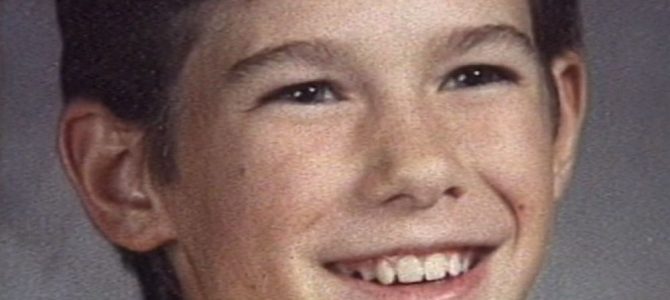
Jacob Wetterling’s face is as familiar to me as any of my childhood friends. Although I never met him, I was seven in 1989 when a gunman snatched 11-year-old Wetterling just a half mile from his home, telling his brother and friend to flee. His smiling face with the sandy, tousled hair remains hauntingly etched into Minnesota’s psyche.
Since then his family, the community, Minnesotans, and supporters nationwide held out a glimmer of hope that he just might be alive. Those hopes were crushed last week when, after 27 years, his abductor informed police where Wetterling’s remains lay. Wetterling’s story, although tragic, offers glimmers of hope about the human spirit, at a time when we need it most.
Evil Always Lurks Among Us
When Wetterling was abducted in 1989 in a small town, it shocked Minnesota. As The Star Tribune said, “Jacob’s abduction shattered the entire state’s sense of safety. He became the face of thousands of other missing and exploited children…” It was hard to imagine a prepubescent child taken in front of others, so close to his home, never to be heard from again. Even though child abductions by strangers are rare compared to other ways children die, they are nonetheless frightening. It was hard to imagine why someone would do that. It still is.
Wetterling’s abductor, Danny Heinrich, is a parent’s worst nightmare. Convicted of two burglaries, Heinrich was a “person of interest” in the Wetterling case from the get-go. His DNA matched DNA found on a child sexually assaulted that same year, but the statute of limitations had passed by the time police were able to match the two, and he was never charged.
When police searched Heinrich’s home, they found no link between him and Wetterling but did find 19 three-ring binders full of 100 images of child pornography. That landed him in federal custody. Neitzsche said “Man is the cruelest animal.” It’s hard to read about Heinrich and disagree.
But even before Heinrich became definitively linked to Wetterling’s death, the Wetterling family did not completely despair when he disappeared. They grieved in a way we all could understand, and they were resilient in a way we found unbelievably hopeful.
Hustle While You Wait
Just four months after her son was abducted, his mother did not sit on her laurels and grieve aimlessly. Patty Wetterling founded the Jacob Wetterling Foundation, a nonprofit organization dedicated to child safety education. Since then she has tirelessly pushed related laws: for one, Jacob’s disappearance “became the driving force behind the creation of national databases for registered sex offenders.”
Passed in 1994, the federal Jacob Wetterling Crimes Against Children and Sexually Violent Offender Registration Act “requires states to form registries of offenders convicted of sexually violent offenses or offenses against children, and to form more rigorous registration requirements for sex offenders. States must also verify the addresses of sex offenders annually for at least ten years, and those offenders classified as sexually violent predators must verify their addresses quarterly for the rest of their lives.”
Wetterling has remained vigilant regarding sex offenders, even speaking out when she thought the laws were too broad, especially as the Internet has increased in relevance since the law was passed. She said in an op-ed, “I’m worried that we’re focusing so much energy on naming and shaming convicted sex offenders that we’re not doing as much as we should to protect our children from other real threats.”
Wetterling ran against my former boss, Rep. Michele Bachmann, for Congress. Although she did not win, I recall from one of the debates between the two women that Wetterling was polite but focused, with her advocacy about Jacob the center of her campaign.
‘Hope Dies Last’
When Jacob’s remains were finally found, his mother tweeted this:
Our family is drawing strength from all your love & support. We're struggling with words at this time. Thank you for your hope. #jacobshope
— Patricia Wetterling (@pattywetterling) September 3, 2016
Displaying the incredible depth of a mother’s love for her child, Wetterling always held out hope she would find Jacob alive. Even in his now-confirmed death 27 years later, she is shaken but refers to hope.
Alexander Pope wrote that “Hope springs eternal in the human breast.” What a dichotomy of ideas: That a mother can live knowing an evil man has done the most unthinkable act a parent can imagine to her child, yet cling to hope, that sometimes-elusive treasure. If evil is the murkiest mud imaginable, then hope is that glimmer of light in the heavens—within eyesight, but just out of reach.
Although Patty Wetterling and her loved ones mourn the loss of Jacob (and Minnesota grieves with her), she has taught us all a valuable lesson about the resiliency of the human spirit. If she can survive and make a difference in spite of all she has endured, what will the rest of us do with our dark times, with our glimmers of hope? How will we fight the monsters who lurk in our neighborhoods and lives, and how often will we fall asleep at night knowing, praying, that hope really does die last?









